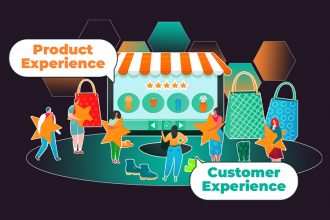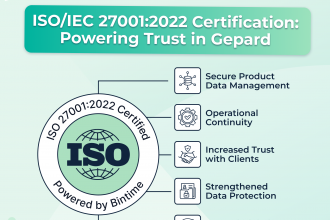A Guide To eCommerce Customer Journey Touchpoints And Mapping
Did you know that 96% of consumers are loyal to brands that offer intuitive and user-friendly customer journey touchpoints? Moreover, corporations that offer unparalleled end-to-end shopper service generate up to 5.7 times more revenue than their competitors. From these statistics, it’s apparent that the kind of sales experience offered in your venture can build or break the brand.
But again, streamlining shopper touchpoints in sales funnels is not a one size fits all. It can even be more daunting when you think you have the consumer right from point A to C, only for them to abandon the cart at the checkout. Also, shopper patterns and behavior evolve in tandem with technology and emerging preferences.
This guide takes a deep dive into customer journey mapping touchpoints, how they work, and how you can improve them in your venture. We also highlight and answer some of the frequently asked questions about an optimized customer touchpoint. Keep reading to gain more insights on customer journey vs customer experience.
What Are Touchpoints In Customer Journey Mapping?
What Are Customer Journey Touchpoints Examples?
Customer journey mapping touchpoints vary from one venture to another. Nonetheless, the purpose of CJM is to offer interaction and encounters between shoppers and corporations. When optimized well, customer journey touchpoints can help convert that new shopper into a loyal, long-term consumer. That said, customer journey touchpoints examples are divided into the following categories:
1. Enroute to Buying
These include all ways and points of interactions a shopper has before purchasing your merchandise or service. The primary points here include websites, blog content, and social media pages. Other before-buying touchpoints customer journey include testimonials, advertising, and marketing channels.
2. During dealings
During purchase, these are interactions that happen once the shopper decides to buy the merchandise through the website or physical store. During this stage, shoppers also interact with sales teams through phone or messaging systems. Other points may include catalogs or promotions.
3. After buying
The customer journey eCommerce won’t be complete until you bill the shopper and offer online help if it’s needed. CJM is critical at this stage as it helps evaluate client experience and upsell upcoming merchandise. The points of user experience interactions may include marketing & transactional emails, thank you cards, and feedback surveys.
How Shoppers’ Touchpoints Work
To fathom how they work and eventually evolve into a journey, let’s highlight a measurable and routine service, such as a mortgage. A typical shopper will likely know about your mortgage service from an advert that offers relatively affordable interest rates. Alternatively, a happy consumer might recommend the mortgage to a new shopper by word of mouth.
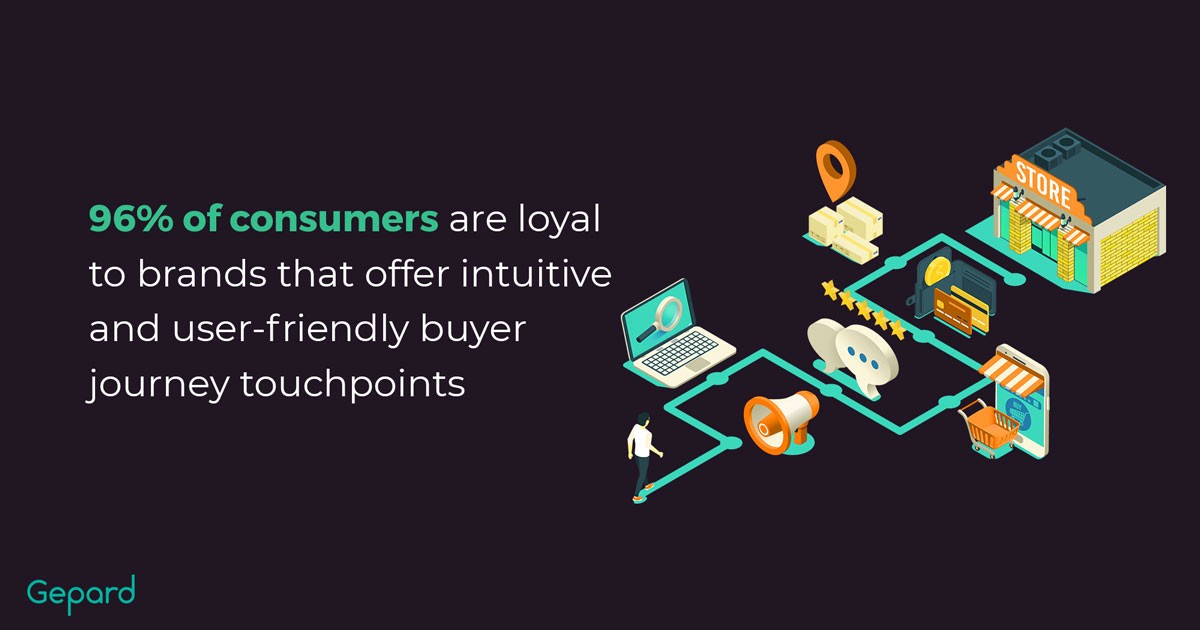
Either way, the shopper will visit your website and estimate their repayments using an online calculator. If the information is helpful, they will book a face-to-face meeting in your physical location for further briefing and inquiries.
The shopper will then take a form to fill out later at home, with the intention of initiating a contract. You’ll then send an email notification with a decision in principle if the potential user’s first application goes through. At this stage, a company agent might also call the consumer to inquire about missing information, if there is any.
The user is now eligible for a mortgage and the venture sends them a binding mortgage offer. The offer might include the house buying process, debit details, and the general terms & conditions surrounding the contract. Once the user signs the offer, the acquisition process is complete.
However, ongoing interactions with the user will likely happen through monthly or annual statements. It’s imperative to note that the needs of a typical mortgage shopper change with time in terms of repayment plans.
How To Enhance CJM by Improving Touchpoints
Brands that enhance their processes by improving the interaction points are likely to experience an 80% uptick in revenues. This is especially if they know how to place touchpoints in a customer journey map and enhance that to satisfactory levels. Here are some tips to get you started with enhancing customer experience map touchpoints.
1. Choose A Customer Journey To Enhance
Of course, consumers have different issues when it comes to their buying experience with brands. It will help if you focus on a particular customer journey enhancement by setting clear objectives based on individual shopper personas.
For instance, you can leverage the jobs-to-be-done (JTBD) framework to get a better idea of your shopper’s needs. This will help you define individual personas in terms of habits and anxieties. Eventually, you’ll outline each shopper’s personal goal and enhance their experience.
2. Outline The Touchpoints For The CJM
There are various user touchpoints, depending on your merchandise and venture policy. Start by outlining the critical points for streamlined shopper service mapping. After that, list down consumer actions on every point.
This will give you insights into their emotions and motivations. That way, you can eliminate obstacles and pain points to enhance the overall experience.
3. Analyze Resources
The amount of resources you channel towards enhancing CJM by streamlining points of contact correlates to the results you’ll likely get. That said, it will help if you list down all the resources at your disposal before outlining how you’ll use them.
It will also be in the best interest of your efforts if you map the resources on the right points that enhance the overall user experience.
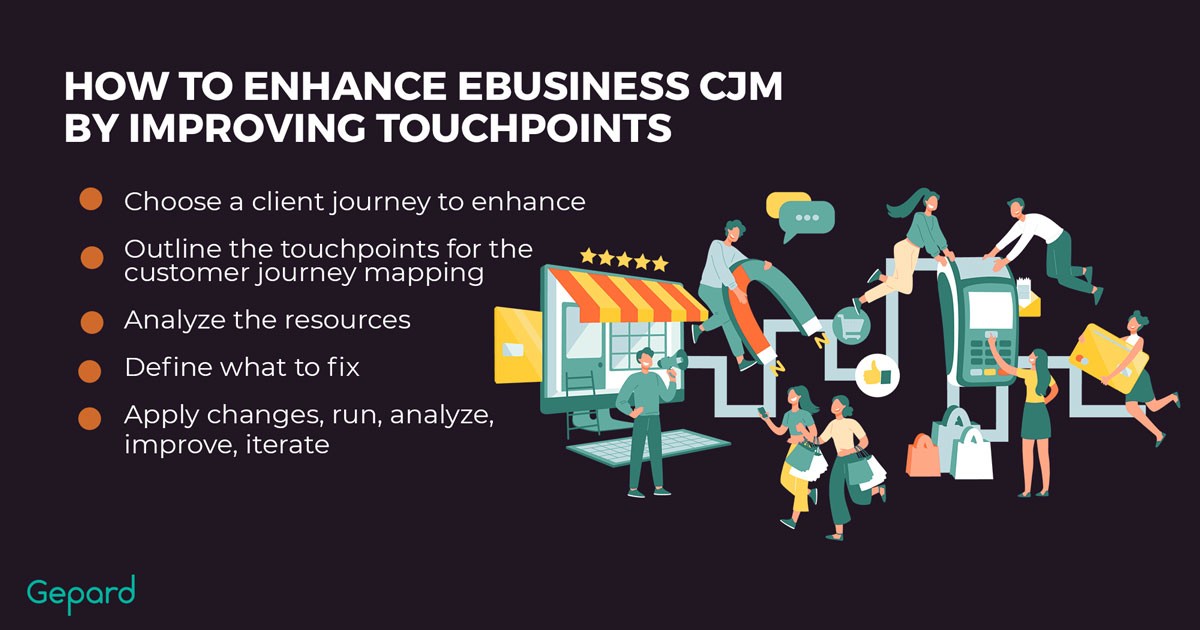
4. Define What To Fix
Fathoming your shopper needs is one thing. But taking an action-oriented approach for customer journey enhancement is different. In that regard, start by clearly defining what you’re going to fix in the shopper journey mapping strategy.
For example, if the onboarding process is what downplays their experience, the proactive action needed is to improve on that. The faster you rectify the issue, the sooner you’ll likely complete your mapping goal.
5. Apply Changes, Run, Analyze, Improve, Iterate
Typically, there is no single linear journey that your shopper is guaranteed to take because of their dynamic needs and preferences. You’re also targeting different audiences with your user experience points of contact. Moreover, customer touchpoint mapping is an ongoing process.
With that in mind, run and analyze your customer journey touchpoints regularly. This will help you to improve, iterate, and apply changes to your existing strategies as much as needed. Eventually, this will help you streamline the sales experience in every touchpoint and journey.
Benefits Of Revising CJMs Regularly
A shopper service mapping strategy that works today may not work tomorrow. Similarly, a strategy that worked on a particular consumer segment may not work effectively on a different one. But if you revise your CJMs regularly, you’ll likely experience an array of benefits, including:
1. Retaining Your Shoppers
Revising your customer touchpoint mapping strategy helps your team to fathom consumer feelings and emotions better. Going above and beyond these aspects will likely streamline pain points across various sales channels. You’ll also get real-time insights into the reasons why shoppers abandon carts in their website journey. All these will help you retain more satisfied patrons.
2. Effective Shopper-Based Approach
Corporations often collect various sets of data throughout user mapping journeys. You can leverage this data to shift your approach from venture to user-centric. For instance, regular revision of your CJMs will give you insights into a shopper persona. You can then use this information to predict user habits and emotions, especially if you know how to place touchpoints in a customer journey map. Eventually, you’ll have a better fathoming of your patrons and have a meaningful connection with them.
3. New Clientele Bases
Shoppers always have high expectations when it comes to interacting with brands for the first time. Revising your CJMs regularly will help you fathom the touchpoints that fail when it comes to shopper acquisition. That way, you can fathom how they view your venture, improve on that and unlock new shopper bases.
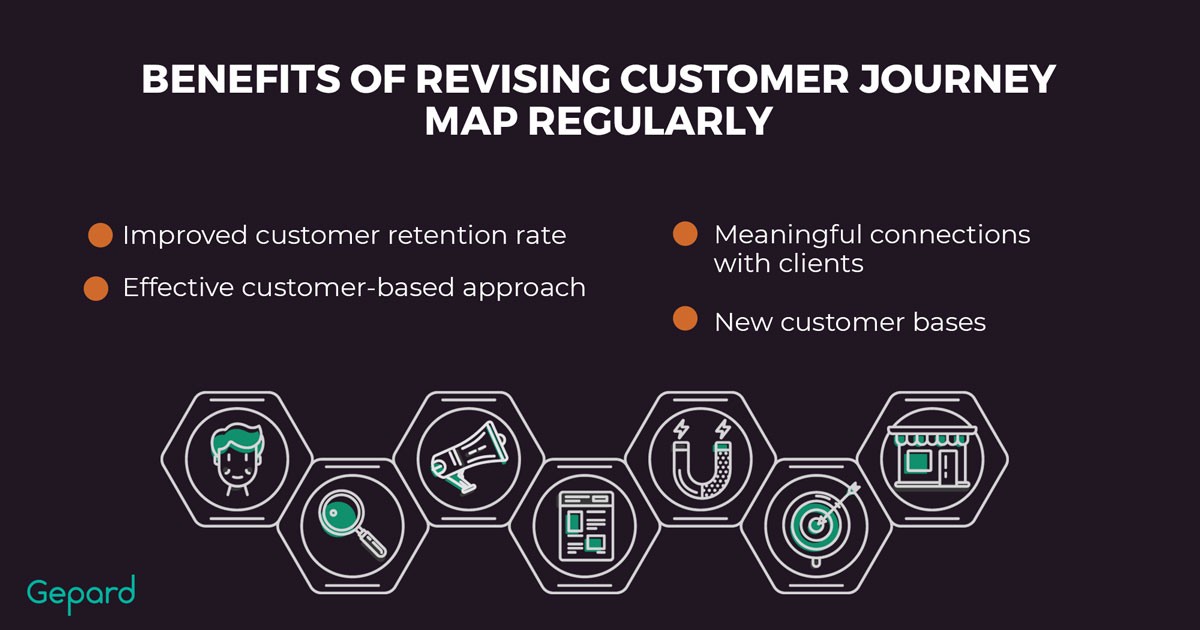
eCommerce Customer Experience Touchpoints FAQ
Why Is Optimizing User Touchpoints Online Beneficial For Clients?
Optimizing customer journey touchpoints online helps corporations stimulate sales and improve user experience. It also helps with new shopper acquisition and holding, while also highlighting key issues that might hinder growth.
How Many Touchpoints Are There In A Shopper’s Experience?
A shopper journey map has various points of contact, broadly categorized into three interactions. This includes various touchpoints before, during, and after a complete buying process.
What Makes A Good Shopper Experience?
A good user journey encompasses positive engagement at all examples of touchpoints in the customer journey, as well as fulfilling consumer expectations. Most importantly, good shopper service is customized, timely, relevant, and consistent.
Ameliorate The Journey Of Your Patrons With Gepard
A user journey with an end-to-end seamless experience is vital for any eCommerce venture that wants to succeed and beat or match the competition. To get it right, you need an operational and cultural shift approach that streamlines points of contact across all channels, from top to bottom. Corporations that succeed in optimizing their user journey touchpoints enjoy better user and employee experiences. It’s also worth noting that merchandise data is key when it comes to shopper service because your consumers interact with merchandise data at nearly all points of contact.
Gepard helps eCommerce brands to manage their merchandise information effectively to enhance the consumer experience. Our PIM data syndication solution is ideal for brands or manufacturers selling merchandise across multiple channels. We can help you deliver merchandise information rapidly across the channels with all your consumer journeys in mind.
Contact us and schedule a personalized demo with our team to see how Gepard can help improve your customer sales journey touchpoints.


